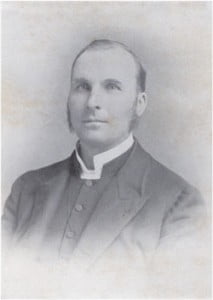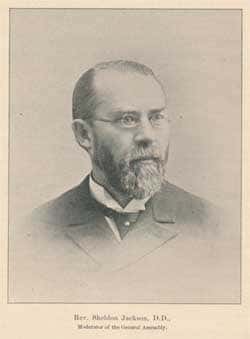 One of the Last Great Southern Presbyterians was a Canadian!
One of the Last Great Southern Presbyterians was a Canadian!
Francis Robert Beattie was born near Guelph, Ontario, Canada on 31 March 1848. His father was Robert Beattie and his mother, Janette McKinley Beattie. Francis attended the University of Toronto, graduating there with the BA degree in 1875 and the MA in 1876. He next attended Knox College in Toronto, in 1878. That same year he was licensed and ordained, on 11 November 1878 by Peterboro Presbytery (Presbyterian Church of Canada), being then installed as the pastor of the Balto and Cold Springs churches in Canada. He served this group from 1878 to 1882. During this pastorate, he married Jean G. Galbraith of Toronto in 1879. She later died in 1897. Rev. Beattie resigned his first pulpit to become the pastor of the First Presbyterian Church of Brantford, Canada. Rev. Beattie also remarried, though that date of the marriage is not provided in the record. His second wife was Lillie R. Satterwhite, and she survived her husband, passing into glory on 20 August 1940).
Rev. Beattie only served the Brantford church from 1882-1883, apparently leaving that pulpit to take up doctoral work. He attended Illinois Wesleyan University in Bloomington, Illinois and successfully completed his dissertation in 1884. There is no mention in the record as to how he was employed during the period from 1885 through 1887, but in 1888 he transferred his credentials to the Presbyterian Church in US, taking a post as professor of Apologetics at the Columbia Theological Seminary. He held this position from 1888 until 1893. In 1893, he became one of the founding professors, along with T.D. Witherspoon and others, at the newly formed Louisville Presbyterian Theological Seminary (KY), serving as Professor of Systematic Theology and Apologetics from 1893 until his death in 1906. During these final years of his life he also worked as an associate editor of The Christian Observer. He died in Louisville, Kentucky on September 3, 1906 and is buried in Louisville’s Cave Hill Cemetery, in Section D, Lot 26, along with his wife and one Thomas Satterwhite Beattie. Thomas may have been a son born to that marriage, though this is unclear at this time. Thomas died on May 27, 1904.
Honors afforded Rev. Beattie during his lifetime include the Doctor of Divinity degree, awarded by the Presbyterian College of South Carolina in 1887 and the LL.D. degree, awarded by Central University of Kentucky. Dr. Beattie served on the PCUS Assembly’s Editing Committee for the 250th Anniversary of the Westminster Assembly and wrote the introduction to the volume produced in celebration of that occasion.
A Bibliography for the Rev. Francis R. Beattie—
1885
An examination of the utilitarian theory of morals (Brantford : J. & J. Sutherland, 1885), 222pp.
1887
The methods of theism, an essay (Brantford, Ont. : Watt & Shenston, 1887), 138pp.; 23cm.
1888
The higher criticism, or, Modern critical theories as to the origin and contents of the literature and religion found in the Holy Scriptures, being a paper read before the Brantford Ministerial Alliance (Toronto : W. Briggs, 1888), 56pp.
Linscott, T.S., E.C.B. Hallam, Francis R. Beattie and R.W. Woodsworth, The path of wealth, or, Light from my forge : a discussion of God’s money laws, the relation between giving and getting, cash and Christianity
(Brantford, Ont. : St. John, N.B. : Bradley, Garretson, 1888), 431pp.; illus.; ports.;
1890
“Christian Apologetics, The Presbyterian Quarterly, 4.3 (July 1890) 337-369.
1893
“General Assembly of the Presbyterian Church in Canada, The Presbyterian Quarterly, 7.4 (October 1893) 607-611.
“The Toronto Council of the Alliance of the Reformed Churches Holding the Presbyterian System, The Presbyterian Quarterly, 7.1 (January 1893) 108-120.
1894
Radical criticism. An exposition and examination of the radical critical theory concerning the literature and religious system of the Old Testament Scriptures (New York, F.H. Revell, 1894), 323pp.; 21cm. With an introduction by W. W. Moore.
1895
“Primeval Man, The Presbyterian Quarterly, 9.3 (July 1895) 351-371.
The second advent of Christ (Louisville, Ky. : Converse & Co., 1895), 30pp.; 20cm.
1896
The Presbyterian Standards : An Exposition of the Westminster Confession of Faith and Catechisms (Richmond, Va. : Presbyterian Committee of Publication,1896), 431pp.; 22cm.
Otts, J.M.P. and Francis R. Beattie, Christ and the Cherubim, or, The Ark of the Covenant a type of Christ our Saviour (Richmond, Va. : Presbyterian Committee of Publication, 1896), 63pp.; 19cm.
1897
“Introduction,” to Memorial Volume of the Westminster Assembly, 1647-1897 (Richmond, VA : The Presbyterian Committee of Publication, 1897), pp. vii-xxxviii.
Excerpt from Rev. Beattie’s introduction to the above volume, pp. xxvi-xxvii:
In Geneva, in Holland, and in Scotland, the Reformation was perhaps made more thorough than in any other land, and it was from these centers that certain influences were brought to bear upon the Reform movement in England for many years prior to the Westminster Assembly. As is well known, there was in Elizabeth’s day a strong party in England who wished for a more complete reform in religion than the Episcopacy of that time represented. This party, in her day, and afterwards, in the time of James I and Charles I, was in constant communication with the thorough-going Reformers in Scotland and on the continent. This indicates the connection of the Westminster Assembly in England with the true Reform life of Scotland and the continent. This is also clearly shown from the ordinance of Parliament calling the Assembly, wherein it is stated that the Assembly shall seek to bring the church in England into “nearer agreement with the Church of Scotland and the other Reformed Churches abroad.” Thus it came to pass that this memorable Assembly, whose splendid story is so grandly told in the addresses which make up this volume, gathered up into itself the varied yet kindred streams that flowed from the pure springs which rose among the hills of Scotland, the mountains of Switzerland, and the plains of Holland; and then, in turn, this Assembly, with its venerable symbols, has, in the providence of God, ever since been the unfailing reservoir from which has flowed numberless pure and life-giving streams into lands far and near, to make glad the city of God even to the ends of the earth. That we have one stream from that reservoir still pure, ever purified, flowing through our beloved Zion, should evoke our grateful praise and provoke our earnest zeal to open up other channels, that this stream may refresh the waste places of the earth.
1899
“Genesis of the Westminster Assembly, The Presbyterian Quarterly, 13.2 (April 1899) 189-205.
“Some Salient Features of Presbyterian Doctrine, The Presbyterian Quarterly, 13.4 (October 1899) 653-684.
1901
Calvinism and Modern Thought (Philadelphia : Westminster, 1901), 48pp.; 18cm.
“The Inauguration of Dr. Briggs, The Presbyterian Quarterly, 5.2 (April 1891) 270-283.
1902
“The Egyptian Book of the Dead, The Presbyterian Quarterly, 16.1 (July 1902) 30-44.
1903
Apologetics; or, The rational vindication of Christianity (Richmond, Va. : The Presbyterian committee of publication, 1903), v.; 24cm.
Apologetics, or, The rational vindication of Christianity, in three volumes. Volume I. Fundamental apologetics (Richmond, Va. : Presbyterian Committee of Publication, 1903), 605pp.; 24cm.
1904
“The Place and Use of the Bible in the Public Schools of the United States, The Presbyterian Quarterly, 17.4 (April 1904) 512-537.
1888-1914
Beattie, Francis R., John McNaugher and William H. Black, Report of a special committee on the Bible in the public schools of the United States of America (Philadelphia : The Alliance, 1888-1914), 16pp.; 23cm. One copy located at the Pittsburgh Theological Seminary.

